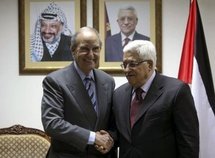
US envoy George Mitchell (left) and Palestinian president Mahmoud Abbas in the West Bank city of Ramallah
However, the Palestinians have refused to give a green light for the so-called proximity talks until a decision is taken by the Palestine Liberation Organisation, which was due to meet on Saturday.
"It is premature to speak for the moment of an agreement to launch negotiations because the Palestinian leadership, which makes decisions, has not yet met," chief Palestinian negotiator Saeb Erakat said after the Abbas-Mitchell talks.
Erakat, who also attended the meeting, said the Americans would be told of the Palestinian decision after the PLO meeting and that Abbas would probably meet Mitchell twice more over the weekend.
A formal US announcement would come on either Saturday or Sunday, Erakat said, adding that Friday's meeting dealt with "a number of issues related to negotiations."
Earlier on Friday, Israeli President Shimon Peres told Mitchell that security must be a top issue in Washington's efforts to launch the indirect peace talks.
"Resolving security issues is of the highest importance," he said.
Peres recalled that Palestinian militants fired thousands of rockets at Israel after it pulled its troops and settlers out of the Gaza Strip in 2005, but he also insisted that the Jewish state wants peace.
"Israel aspires to a historic peace accord with the Palestinians that will lead to a Palestinian state alongside Israel," said the Nobel Peace Prize laureate, whose presidential functions are largely ceremonial.
The Palestinians have said they want the peace agenda to put the priority on the borders of their promised future state.
The two sides are widely expected to start indirect, US-mediated talks within days, but expectations of significant achievement remain low in both camps.
Direct negotiations produced virtually no tangible results by the time they collapsed in December 2008 just over one year after they restarted following a seven-year hiatus.
The direct negotiations ended after Israel launched a deadly offensive against Gaza aimed at halting militant attacks.
The Palestinians agreed in March this year to take part in proximity talks but then pulled out after Israel announced plans to build 1,600 homes in annexed Arab east Jerusalem.
After receiving US assurances that the Jerusalem settlement expansion plan would be put on hold, the Palestinians eventually agreed to consider a new attempt at proximity talks.
They want east Jerusalem as the capital of a promised Palestinian state, but Israel considers all of the Holy City to be its "eternal and indivisible" capital.
Jerusalem and Jewish settlements are among the thorniest issues in efforts to achieve a peace deal.
Last November, Israel imposed a partial, 10-month freeze on settlement construction in the occupied West Bank, but the moratorium does not cover occupied east Jerusalem, or buildings already under construction.
----------------------------------------------------------------------------
"It is premature to speak for the moment of an agreement to launch negotiations because the Palestinian leadership, which makes decisions, has not yet met," chief Palestinian negotiator Saeb Erakat said after the Abbas-Mitchell talks.
Erakat, who also attended the meeting, said the Americans would be told of the Palestinian decision after the PLO meeting and that Abbas would probably meet Mitchell twice more over the weekend.
A formal US announcement would come on either Saturday or Sunday, Erakat said, adding that Friday's meeting dealt with "a number of issues related to negotiations."
Earlier on Friday, Israeli President Shimon Peres told Mitchell that security must be a top issue in Washington's efforts to launch the indirect peace talks.
"Resolving security issues is of the highest importance," he said.
Peres recalled that Palestinian militants fired thousands of rockets at Israel after it pulled its troops and settlers out of the Gaza Strip in 2005, but he also insisted that the Jewish state wants peace.
"Israel aspires to a historic peace accord with the Palestinians that will lead to a Palestinian state alongside Israel," said the Nobel Peace Prize laureate, whose presidential functions are largely ceremonial.
The Palestinians have said they want the peace agenda to put the priority on the borders of their promised future state.
The two sides are widely expected to start indirect, US-mediated talks within days, but expectations of significant achievement remain low in both camps.
Direct negotiations produced virtually no tangible results by the time they collapsed in December 2008 just over one year after they restarted following a seven-year hiatus.
The direct negotiations ended after Israel launched a deadly offensive against Gaza aimed at halting militant attacks.
The Palestinians agreed in March this year to take part in proximity talks but then pulled out after Israel announced plans to build 1,600 homes in annexed Arab east Jerusalem.
After receiving US assurances that the Jerusalem settlement expansion plan would be put on hold, the Palestinians eventually agreed to consider a new attempt at proximity talks.
They want east Jerusalem as the capital of a promised Palestinian state, but Israel considers all of the Holy City to be its "eternal and indivisible" capital.
Jerusalem and Jewish settlements are among the thorniest issues in efforts to achieve a peace deal.
Last November, Israel imposed a partial, 10-month freeze on settlement construction in the occupied West Bank, but the moratorium does not cover occupied east Jerusalem, or buildings already under construction.
----------------------------------------------------------------------------









 Home
Home Politics
Politics









